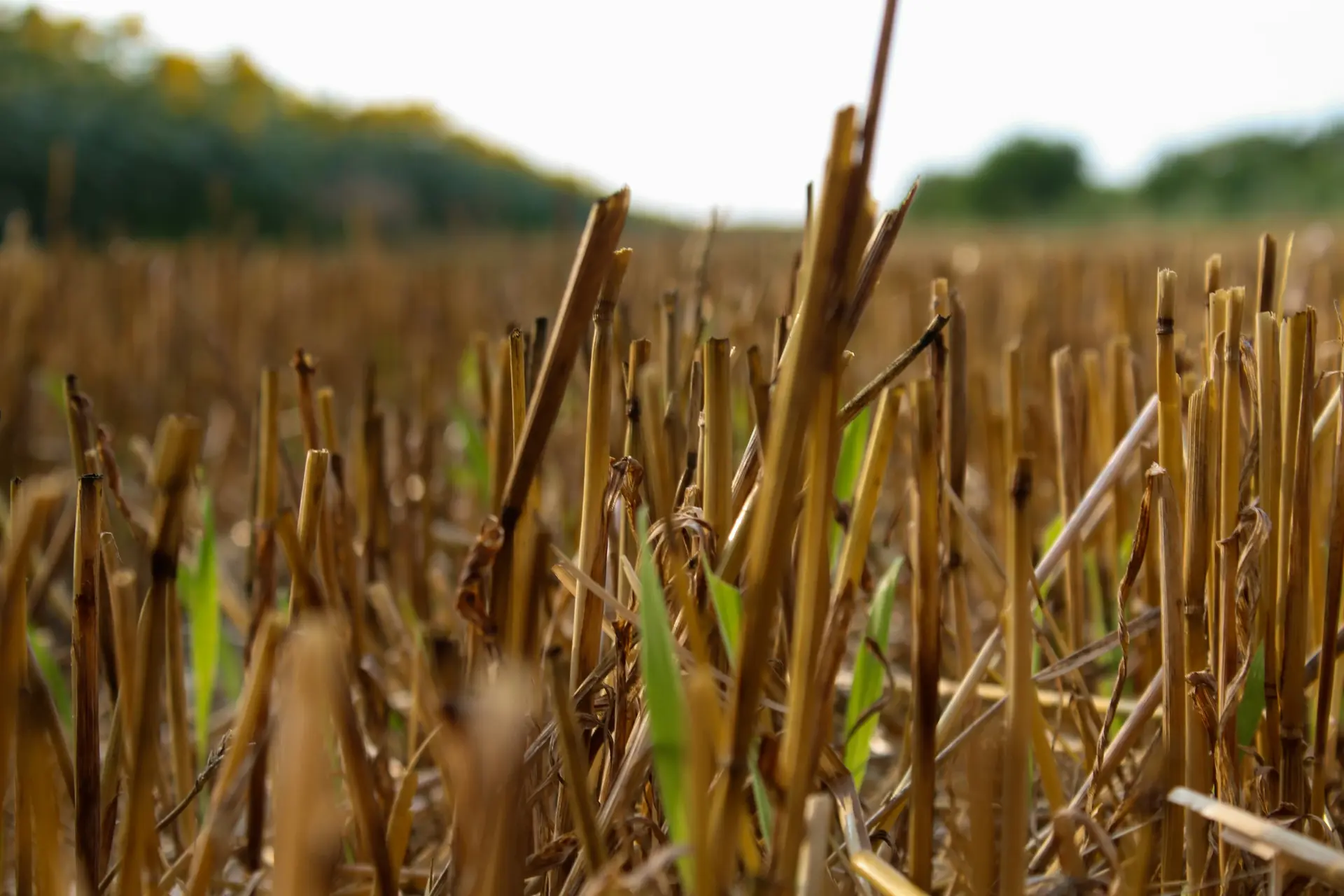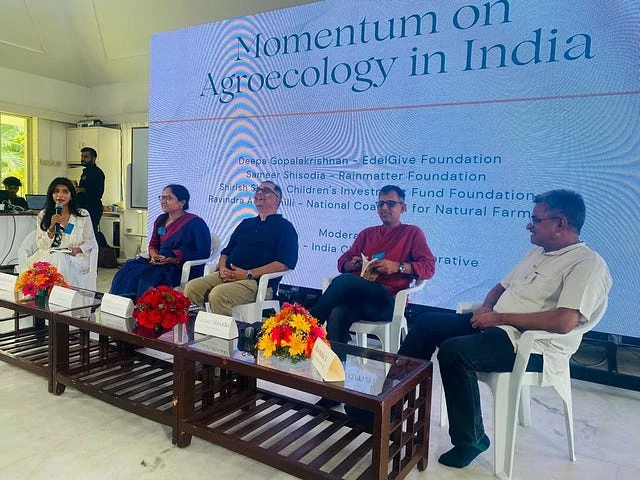A big priority for the ICC’s collaborative model is to ensure multiple voices reach funders in our network. We reached out to eight incredible civil society organisations in India’s climate ecosystem to hear their perspectives on successes and challenges from 2024. We asked them to highlight one impactful climate initiative they are working on, how it benefits communities they work with and the ecosystem, and one win and one challenge that they’d like funders to hear about. Hear directly from them below.
(The organisations are listed A-Z).
Aga Khan Rural Support Programme India (AKRSP-I)
Centre for Grower-Centric Ecovalue Mechanisms (C-GEM)
C-GEM is an ecosystem platform to accelerate climate mitigation and adaptation benefits to local communities. This is done by scaling the adoption of agroecological practices at the grassroots level by leveraging climate, ecosystem, and carbon financing instruments. It is the only not-for-profit initiative in the world that focuses on growers and negotiates with the market on their behalf.

The "tree of agroecology", C-GEM's mascot, beautifully depicts the relationship between communities and ecosystem services. © Sunil bhai, AKRSPI
One win from 2024: We have successfully facilitated four projects with nine grassroot partners and two market intermediaries to serve 82,000 farmers, with a total project value of INR ~300 crores and projected verified emission reduction of 3.52 million metric tonnes in the next 20 years. Our negotiations have successfully saved INR 25 crores in total project value for our farmers.
One challenge from 2024: Verified climate projects are essential for India to achieve its net zero emissions goal by 2070 and facilitate the transition to natural farming. However, the risk of business capture threatens community interests, as indicated by the fact that only 0.3% of monetary benefits from such projects have reached local communities over the past 20 years. To create meaningful, sustainable initiatives, philanthropy must provide strategic and catalytic capital that prioritises a farmer-first approach, empowering local communities and ensuring an equitable distribution of benefits. This collaboration is vital for developing long-term, high-quality climate solutions that genuinely support both our environmental goals and the livelihoods of farmers.
The Center for Study of Science, Technology and Policy (CSTEP)
The Rooftop Solar Explorer - Chhattisgarh
The Rooftop Solar Explorer - Chhattisgarh is an innovative rooftop solar capacity estimator and a business case calculator (for 25 years). It helps the user choose the ideal location with the least shadow and maximum solar radiation for their rooftop solar system. It uses drone-based, high-resolution aerial imagery and rich datasets including annual consumption profiles and connected distribution transformer details. Learn more about the initiative here.

Aerial view of the office of the Chhattisgarh State Power Distribution Company Limited, captured using drones for the Rooftop Solar Explorer tool in Chhattisgarh. © CSTEP
One win from 2024: The Chhattisgarh Chief Minister Shri Vishnu Deo Sai launched CSTEP's Rooftop Solar Explorer tool for Chhattisgarh on 23 October 2024. The RTSE tool for Chhattisgarh is available on the Chhattisgarh State Power Distribution Company Limited’s website. With the introduction of the PM Surya Ghar Muft Bijli Yojana by the Indian government this year, the RTSE tool will be highly beneficial to those looking to set up rooftop solar in the state and to meet Chhattisgarh's target to solarise 5 lakh households. Rooftop solar is a decentralised distributed application, which leads to consumers becoming prosumers. It is land-neutral and has no socio-ecological impacts. It also helps DISCOMs meet a portion of their annual increasing demand without incremental AT&C losses.

A drone used to carry out the high-resolution aerial imagery required to set up the Rooftop Solar Explorer tool in Chhattisgarh. © CSTEP
One challenge from 2024: While RTSE is a powerful tool for calculating rooftop solar potential and supporting sustainable energy adoption, one of the primary challenges is the low awareness among consumers about rooftop solar and its benefits. To scale up rooftop solar and to fully realise the impact of RTSE, it is crucial to conduct consumer awareness programmes across India. These efforts could bridge the information gap, enabling more citizens to understand their rooftop solar potential and take actionable steps towards clean energy adoption. Philanthropic support can drive these awareness initiatives, ensuring broader engagement with rooftop solar and accelerating India’s progress toward its sustainability goals.
Collectives for Integrated Livelihood Initiatives (CInI)
Building climate resilience through the Lakhpati Kisan Programme led by women collectives
The Lakhpati Kisan programme, integrated with climate resilience principles, focuses on empowering women collectives to enable meeting their aspirations through economic security, social security, and environmental security. The emphasis is towards ensuring households build on sustainable livelihoods with empowered community institutions.
Watch a short film about this programme, ‘Can Indian women farm the sun?’ and visit CInI’s website to learn more.

Munda didi from the Kanki Hamlet of Purnadih village happy with her tomato production as part of the production hub integrated with renewable energy. © CInI
One win from 2024: A big win from 2024 was seeing community ownership and acceptance towards integrating agriculture and decentralised renewable energy technologies to strengthen livelihoods sustainably.

Meena Behn from the tribal hamlet of Limkheda with her watermelon harvest ready for market. © CInI
One challenge from 2024: There is a need to focus on enabling communities to understand the climate aspects in a simpler manner and building appropriate action plans. Investing in these at the community level is very important, along with investing in relevant technologies and services with the community at the centre.
Keystone Foundation
Climate Smart Schools
“Nurturing climate champions for the holistic wellbeing of the Nilgiri Biosphere Reserve” is the vision of Keystone Foundation’s work. This echoes the organisation’s aspiration to transform climate education in government schools in the Nilgiri Biosphere Reserve, initially starting with 10 schools. It focuses on the school as a whole, with active involvement of internal and external stakeholders for climate action. It has four main pillars: Greening curriculum, Greening Teachers training, Greening School, and Greening Communities as per UNESCO's Greening Education Partnership.

© UNESCO
One win from 2024: The work was recognised by UNESCO and we held a stakeholder meet to assess and understand the importance of climate education. Also, along with Eischer Group Foundation, we were able to scale this work to another mountain ecosystem – Himachal Pradesh.

© UNESCO
One challenge from 2024: Climate education is a continuous process and needs time (at least three years) and funding resources to see impact and behaviour change. But usually, funding is provided for one year and it becomes difficult to work towards a larger goal.
People's Courage International
Global Climate Resilience Collaborative (GCRC)
GCRC aims to build the resilience of climate-affected informal workers, migrants, and vulnerable communities across South and Southeast Asia through social protection and adaptation support. It focuses on designing and supporting grassroots-led projects that can be financed and scaled in collaboration with philanthropy, industry, government, and multilaterals. GCRC’s core focus is on keeping affected communities at the centre of its work across research and storytelling, on-ground pilots and implementation, and advocacy with key actors.
One win from 2024: Producing one of the largest multi-country studies on climate impacts titled "Coping with Climate: How extreme weather is already impacting internal migrants", based on a survey of over 23,915 interviews with internal migrants from South and Southeast Asia in September 2024. This was launched at UNGA Climate Week in New York. The report details specific impacts on households and livelihoods already playing out today due to extreme weather events and calls for coordinated efforts from governments, grassroots organisations, the private sector, and philanthropy to build scalable, climate-resilient solutions.
One challenge from 2024: A major challenge in 2024 is the lack of collaboration among key actors — governments, philanthropy, and industry — who often address climate, labour rights, migration, and social protection in isolation. This siloed approach misses compounded, intersectional vulnerabilities, particularly as current climate adaptation efforts primarily respond to climate extremes, often neglecting slow-onset events and the medium- to long-term impacts that affect millions. Philanthropy must invest in breaking down these silos, putting vulnerable communities at the centre, fostering coordinated grassroots and global efforts, and unlocking financing for sustainable and systemic solutions.
Vasudha Foundation
Navigating the Zero-Emission Truck Transition: Empowering small fleet operators and evaluating socio-economic implications for truck drivers in India
India’s trucking sector is largely unorganised, and over 80% of fleet operators belong to the small-and-medium fleet (SMF) category. SMF operators generally operate with slim operating margins, limited access to financing, and face various other challenges within the ecosystem. In the backdrop of the forthcoming Zero Emission Truck (ZET) transition, it is necessary to support this vulnerable group in adopting ZETs.
Three major outputs were derived from this project:
1. A model roadmap with just transition principles to support SMF operators in India to adopt ZETs
2. A white paper on enabling a just transition for India’s truck driving partners
3. The launch of the Centre for Zero Emission Truck Transition Support (CZETTS)

Empowering progress: From electric trucks to partner insights and a milestone launch. © Vasudha Foundation
One win from 2024: To build on the momentum garnered among SMF truck operators, the Centre for Zero Emission Truck Transition Support (CZETTS) was conceived and launched by the Additional Secretary of the Ministry of Road Transport and Highways. The initiative also received letters of support from the Hon’ble Union Minister of Road Transport and Highways, Shri Nitin Gadkari, and Hon’ble Union Minister of Commerce and Industry, Shri Piyush Goyal. CZETTS has been envisaged to serve as a comprehensive platform to aid SMF operators in creating customised ZET roadmaps and bridging the gap among stakeholders in the trucking value chain. Some of the centre's key value propositions will entail providing guidance to SMF operators, facilitating stakeholder coordination, supporting the adaptation and transition of the existing workforce, and anchoring other technical and secretariat support for the trucking ecosystem vis-à-vis the ZET transition.
One challenge from 2024: Securing buy-in from a fragmented target group is a significant challenge. A bottom-up approach is essential for effective climate action, as shown by the growing detail and specificity in climate action plans worldwide. On similar lines, a ZET transition or any other sectoral decarbonisation measure requires participation from the target groups, which are typically fragmented in nature. There is a need to support awareness building measures curated for the target groups, which informs them of the need and pathways to participating in climate action.
Watershed Support Services and Activities Network (WASSAN)
Water collectives for landscape agroecological transformation and climate resilience
The programme brings farmers in a contiguous rainfed area together to form a water collective. It invests in irrigation systems commonly shared by all through a grid of pipelines and micro irrigation and its collective management. Intensive transformation of crop production towards diversification and intensification using natural farming and access to protective irrigation makes the community resilient to drought-spells. The water collectives in dry land areas pool the private borewells into a common grid with borewell owners, sharing water with rainfed farmers under an agreement to give protective irrigation to mitigate adverse impacts of climate variability. The investments will be returned by farmers to their collective over time.
One win from 2024: The programme model provides for the most critical of resources i.e. water, for agroecological transformation with equitable and sustained access under community management. It has a high rate of return, as much of the investment can be recovered within four years (payback period). This is a high impact climate resilience model with assured impacts. Over 25 cases exist as proof of concept or as a minimum viable number for scaling up.
One challenge from 2024: As public funding of such distributed infrastructure with facilitation support is hard to come by from Government schemes (which are mostly turned to DBT as a mechanism), the model is ideally suited for CSR and philanthropies to take up at scale, to build climate resilient rainfed communities.
Watershed Organisation Trust (WOTR)
Building resilience in agriculture and allied sectors in rural Maharashtra
The project aims to provide strategic support to government departments to promote resilient rural communities living in vibrant ecosystems.
It has four sectoral components:
(i) Contribute to agriculture resilience through nature-friendly practices;
(ii) Strengthen agriculture advisory through deployment of FarmPrecise (a farm-customisable Android app);
(iii) Integrate Ecosystem-based Adaptation (EbA) across policies, sectors, and programmes;
(iv) Enhance water security by improving water management and water governance.
WOTR, in synergy with the State Agriculture Department, has developed “NaturePro”, a framework to assess, benchmark, and categorise villages on their agriculture risk due to climate change and the extent of their adoption of nature-friendly practices. Initially, this will start in three identified districts and later scale-up. This initiative is also providing farmers with access to the “FarmPrecise” app for dynamic, weather-responsive farm-specific and crop-specific management advisory, along with market information.

An infographic of the NaturePro framework and tool developed in collaboration with the Agriculture Department, Government of Maharashtra. © WOTR
One win from 2024: The Agriculture Department, Government of Maharashtra has formally integrated this initiative with the state-sponsored project for natural farming and issued a Government Order dated 12 March 2024. Village assessment and benchmarking is being undertaken jointly by Department staff and WOTR field teams. Suggested actions will lead to enhanced adaptive capacities and increased adoption of nature-friendly practices thereby improving agricultural resilience.
One challenge from 2024: For any initiative to achieve scale and lasting impact, it needs to be aligned with a major publicly funded programme supported by evidence, leading to policy enablement. NaturePro and FarmPrecise have these features that meet local needs, and are location specific and data supported for decision making and action. One challenge in mainstreaming with government projects is a general reluctance to adopt new concepts and a frequent shift in focus due to transfers and changing priorities. The other challenge, specifically with climate action, is ensuring inter-sectoral and trans-departmental coordination within the government. This calls for a broad-spectrum proof of concept through large-scale demonstrations, with strong stakeholder engagement and continuous handholding.

Subscribe to our Newsletter
Join ICC's monthly newsletter and read more about uplifting climate narratives, innovative solutions, and other updates.




